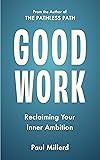Highlights from "Good Work"
By Paul Millerd

work worth doing. I didn’t want to escape work; I just craved work I cared about.
Good work doesn’t usually happen on a factory schedule and often has a natural seasonality. But when you stop doing it, good work seduces you back. It is something you must do. Once you discover your good work, take it seriously and protect it, as it can be one of the most powerful ways to show up in the world, contribute, and feel useful.
This is why freelancing is often a useful, but temporary, first stop for people on unconventional paths. It involves work you are good at and perhaps even enjoy somewhat, but if you try to turn this work into a business or your new identity, you end up creating a job for yourself that includes everything you wanted to escape in the first place.
The corporate world fuels this anxiety: if others are working late in the office, you convince yourself to stay late too. When others get promoted “ahead” of you, you feel insecure and envious because you think it means you aren’t good enough. But when you find a path that is uniquely yours and you are able to fully inhabit it, you have no competitors.
Not working forces you to be with yourself and is a way to fast track going after the life you want.
This is exactly what good work is about: noticing the season of life you are in, right now, and seeing what work you are called to do.
Alcohol helped me ignore the underlying discomfort in my life. I might be frustrated at work but I was always less than five days away from the next chance to party and run from those emotions.
Helping people live courageously so that they can thrive is one of the most important things in the world. I want to see people live the lives they are capable of, not just the ones they think they are allowed to live.
Finding and doing good work almost always requires some sort of sacrifice. At a minimum, you must relinquish your job-based mindset and the belief that a job can deliver everything you desire out of life.
This is a crucial point: by worrying first and foremost about figuring out what people will pay for, too many people on the path toward good work short-circuit their own interests, curiosity, and energy. Instead of searching for skill-market fit, you should start with person-interest fit. What are the activities you absolutely must do? What do you truly care about? As the popular saying goes, “the reward for good work is more work,” so you better like doing it!
You have a choice: you can accept the scripts you grew up with that tell you what a successful work life looks like, or you can author new ones. Life isn’t a single movie script that everyone should perform identically, it’s something we must improvise.
What is the most ambitious path for you? Is there a script for it yet? Or do you need to write your own too?
rushing to directly monetize your good work can be a mistake. The right approach is to treat the work that feels good as sacred, protecting it as long as possible by making money doing something else.
How much great work is never started because of people’s dedication to the standard workweek?
Looking back, what chunks of time feel satisfying and seem to be more important as time progresses? What am I drawn to do, right now? What am I doing already that feels good? At the end of my life, what will I definitely not regret having done?